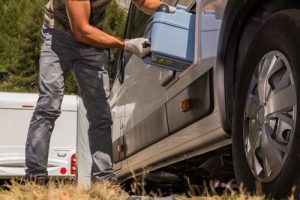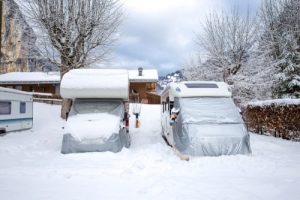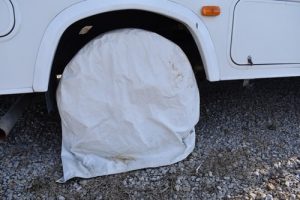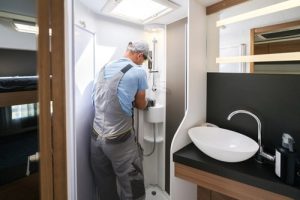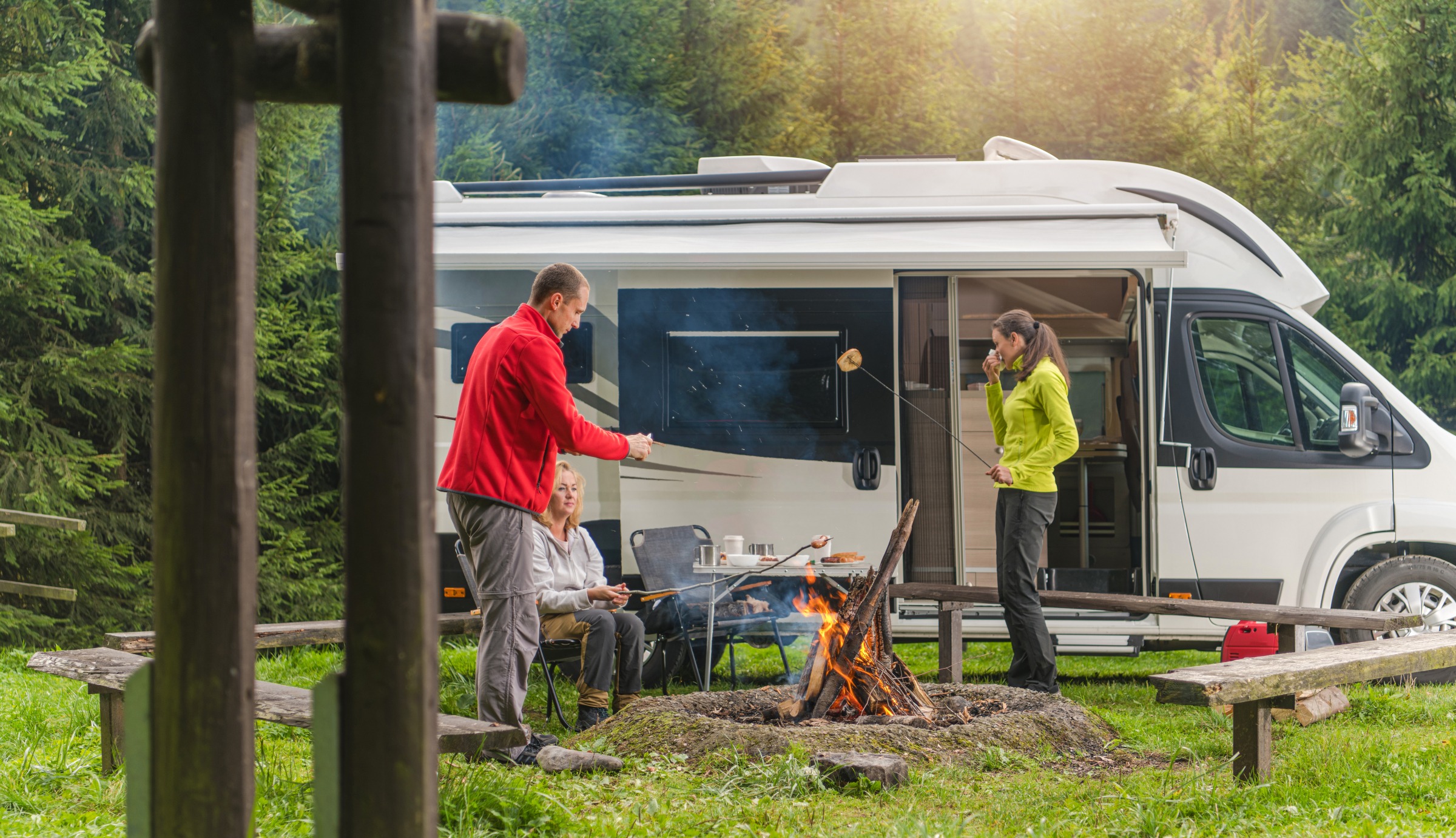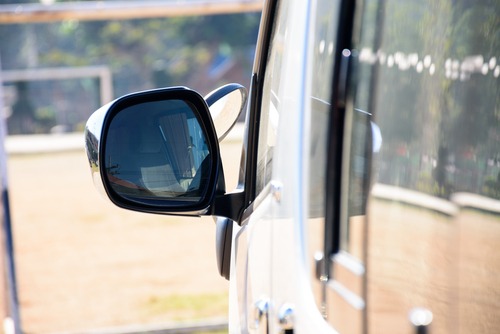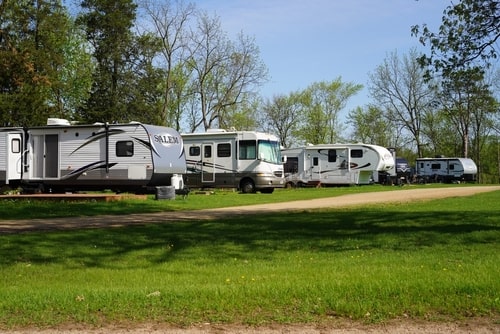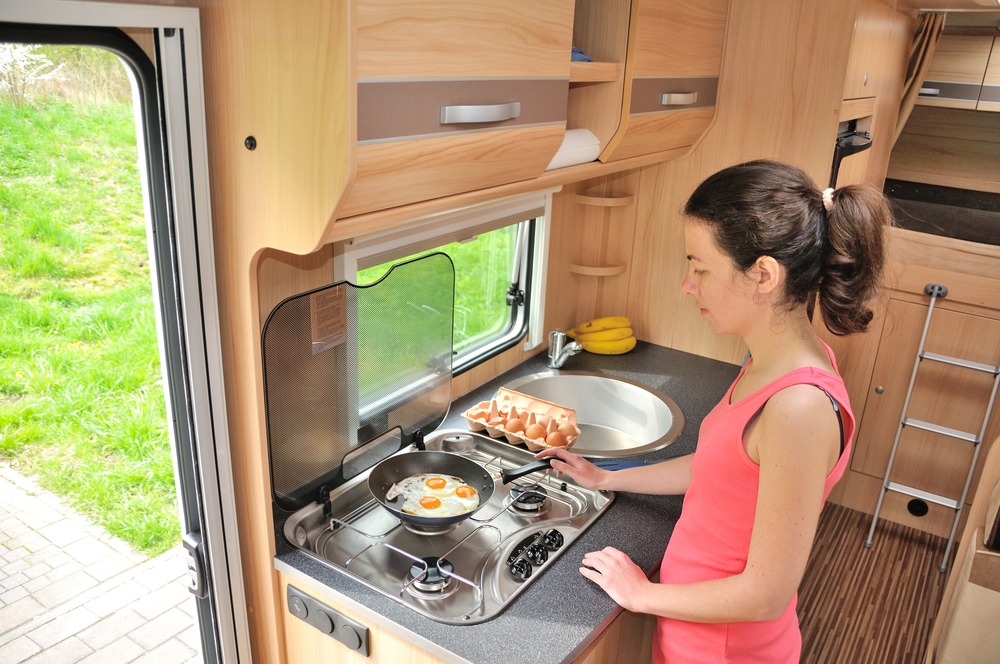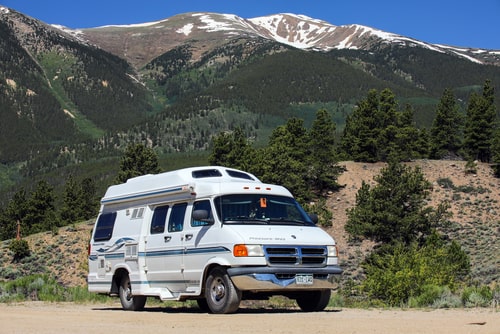
Maintaining your Class B RV is key to ensuring a smooth and enjoyable travel experience. Whether you’re a seasoned traveler or new to the RV lifestyle, understanding the importance of regular maintenance is crucial. This blog will guide you through the essentials of Class B RV maintenance, focusing on general vehicle care, RV-specific systems, and winterizing and seasonal storage.
General Vehicle Maintenance
Your Class B RV is not just a home on wheels; it’s also a vehicle that requires regular automotive maintenance. General vehicle maintenance is crucial for the longevity and safety of your Class B RV. Neglecting these basic maintenance tasks can lead to costly repairs and unsafe travel conditions. Here’s how you can keep your RV in top condition:
Class B RV Maintenance Tips
Engine Care
The engine is the heart of your RV. Regular oil changes with new filters, checking and replacing air filters, and monitoring fluid levels are essential for keeping the engine running smoothly.
Brake System
RVs, especially when fully loaded, are heavy and put a lot of strain on brakes. Regularly inspecting and maintaining the brake system is essential. Make sure to check the pads and rotors every season to ensure safety.
Tire Maintenance
Tires are your only contact with the road, so their care is paramount. Regular checks for proper inflation, tread wear, and any signs of damage are crucial. Make sure to replace them regularly as well.
 Dont Forget Pre-Trip Inspections
Dont Forget Pre-Trip Inspections
Before setting out on any journey, a thorough pre-trip inspection of your Class B RV is essential. This Is something that should be done for every vehicle but it is especially important when you are setting off on an adventure. You will be far from home so if something goes wrong it will be an even bigger problem. This not only ensures your safety but also helps in identifying any potential issues before they become major problems that may ruin your vacation.
Class B RV Pre-Trip Checklist
Tire Pressure and Condition
Check that all tires including the spare! Make sure are properly inflated and free from excessive wear or damage. Keep a tire pressure gauge handy for this.
Fluid Levels
Before heading out check oil, coolant, brake fluid, and windshield washer fluid levels.
Lights and Signals
Recruit a buddy, spouse or responsible child and test all exterior lights – headlights, brake lights, turn signals, and hazard lights.
Brake and Suspension System
Look for any signs of wear or damage. Listen for unusual noises when braking.
Battery Check
Before a trip make sure that the battery is fully charged and the connections are clean and tight.
Window and Mirror Check
Clean all windows and mirrors for clear visibility.
Check Your Emergency Supplies
Ensure that your RV is equipped with necessary emergency gear, including a first-aid kit, fire extinguisher, and road flares.
Conducting these inspections and maintaining your vehicle regularly not only prolongs the life of your RV but also enhances the safety and enjoyment of your travels. You really dont want something to go wrong when your far from home and a quick pre-trip check could help you avoid a disastrous start to your trip.
RV-Specific Systems Maintenance
Like most Trailers and RV’s Class B RVs come with unique systems that most vehicles don’t have. To make sure that your class B RV Maintenance is done right follow these tips:
Plumbing System
Regularly check for leaks and ensure all connections are secure. This includes fresh, grey, and black water systems, which are integral to RV living.
Electrical System
Inspect all electrical connections, including your RV’s battery, inverter, and generator. Electrical issues in RVs can be complex, so consider consulting a specialized RV mechanic.
Heating and Cooling Systems
Regular maintenance of your HVAC system is crucial for comfort. Clean filters and check for any signs of malfunction.
Appliances
Regularly inspect and maintain all built-in appliances like refrigerators, stoves, and microwaves to ensure they are functioning correctly. Also, make sure the propane tank is secure and the lines are free of leaks.
Slide-Outs and Awnings
These features add extra space and comfort to your RV but they require regular maintenance. Make sure to lubricate moving parts and check for any signs of wear or damage.
Winterizing and Seasonal Storage Tips for a Class B RV
Winterizing your RV is a vital step in maintaining its longevity and functionality. As temperatures plummet, the risk of damage to your RV’s plumbing system, engine, and other essential components increases. Freezing temperatures can cause water lines to burst, batteries to lose charge, and the interior to become a shelter for pests if not properly addressed. Have you ever heard of squirrels invading an RV over the winter? It happens! And it can destroy your home away from home. Don’t let it happen to you! By winterizing your RV, you can ensure that these issues are mitigated and you can avoid costly repairs and ensure your vehicle is ready to hit the road as soon as spring hits.
RV Winterization Tip – #1 Pest Control
Pests, such as rodents and insects, can cause significant damage to your RV during storage. They can chew through wiring, insulation, and interior finishes, leading to costly repairs.
Pest Control Checklist
Inspect and Seal Entry Points
Thoroughly inspect the exterior of your RV for any cracks, holes, or gaps. If you find any, seal them with silicone caulk or expanding foam.
Use Natural Repellents
You can place natural repellents like peppermint oil, mothballs, or cedar chips in areas prone to pest infestation. Consider non-toxic, pet-safe options if you have pets that might access these areas.
Clean Interior Thoroughly
Before Storing for the winter, remove all food items, crumbs, and residues that might attract pests. Vacuum and clean the interior, paying special attention to kitchen areas and storage compartments.
Set Traps
As a precaution, you can also set humane traps in and around the RV to catch any pests that might get in.
RV Winterization tip #2 – Covering the RV and Tires
Protecting your RV’s exterior and tires from the elements is crucial to prevent weather-related damage such as rust, sun damage, and tire degradation.
Covering Checklist
Choosing the Right Cover
Select a breathable, water-resistant cover specifically designed for RVs. Ensure the cover fits snugly to prevent wind damage but allows air circulation to prevent mold and mildew.
Prepare the RV for Covering
Clean the exterior of the RV thoroughly before covering it. Make sure to close and lock all windows and doors to create a secure, tight seal. This will prevent moisture and pests from getting in.
Tire Protection
Inflate tires to the recommended pressure to avoid flat spots and use tire covers to shield them from UV rays and harsh weather conditions.
Also, consider placing the RV on jacks to take the weight off the tires.
RV Winterization Tip #3 – Protecting the Plumbing System
The plumbing system in your RV is particularly vulnerable to freezing temperatures, which can cause pipes to burst and lead to significant water damage. To prevent this follow these tips.
Plumbing Protection Checklist
Drain the Water System
Drain all water tanks, including fresh, grey, and black water tanks. Open all faucets and shower valves to ensure complete drainage.
Blow Out the Water Lines
Use compressed air to blow out any remaining water in the lines.
Add Non-Toxic Antifreeze
Pour RV-specific, non-toxic antifreeze into the plumbing system, including drains and the toilet, to protect against freezing.
After Winter, Check for Leaks
Once the system is reactivated in the spring, check for any leaks that might have developed during the winter.
By following these comprehensive steps for pest control, covering, and protecting the plumbing system, you can ensure that your Class B RV remains in excellent condition throughout the winter months.
We hope this guide was helpful and will help you keep your Class B RV in prime condition for years to come. For more detailed assistance or professional services, contact our specialists at Travel Mor Trailer Sales. We can offer expert advice and maintenance services tailored specifically for RV’s. We even offer winter storage!
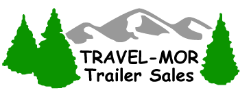
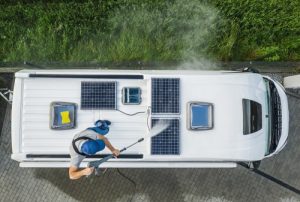
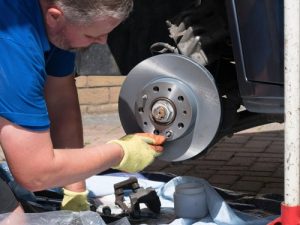
 Dont Forget Pre-Trip Inspections
Dont Forget Pre-Trip Inspections